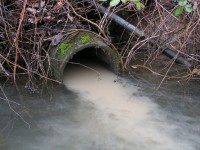Blog post by Columbia Riverkeeper Executive Director, Brett VandenHeuvel—
The Clean Water Act has been incredibly successful in reducing toxic pollution, keeping human waste out of our rivers, and protecting our health. Journalists from InvestigateWest and Earthfix ran a story looking at the successes and failures of the Clean Water Act. While the law is strong on paper, pollution continues to foul our rivers due to lax enforcement, lenient pollution permits, and state loopholes.
Groups like Columbia Riverkeeper work to enforce pollution laws by identifying legal pollution, notifying the dischargers and state regulators, and litigating to stop pollution when necessary. The InvestigateWest and Earthfix story highlights work by our colleagues at Puget Soundkeeper and ends with Columbia Riverkeeper's legal work to reduce pollution:
The Hood River, Ore.,-based environmental group has used the citizen’s suit provisions of the Clean Water Act to go after log yards, scrap yards, plastics manufacturers, truck yards and, memorably, a shipping terminal where lots of bulk chemicals including petroleum coke and potash were stored in the open so that pollutants were carried away in rainwater runoff.
Columbia Riverkeeper’s director, Brett VandenHeuvel, said lawsuits like these are a measure of how much progress remains for the Clean Water Act to work as it was intended.
“In 1972 we were going to stop using our rivers as dumping grounds and we’re nowhere near there,” VandenHeuvel said. “State and federal regulators don’t even try to meet that goal any more and that’s a problem."
Learn more about Columbia Riverkeeper's clean water enforcement work.
Get Involved
There are many ways to get involved in the fight for our right to clean water:



